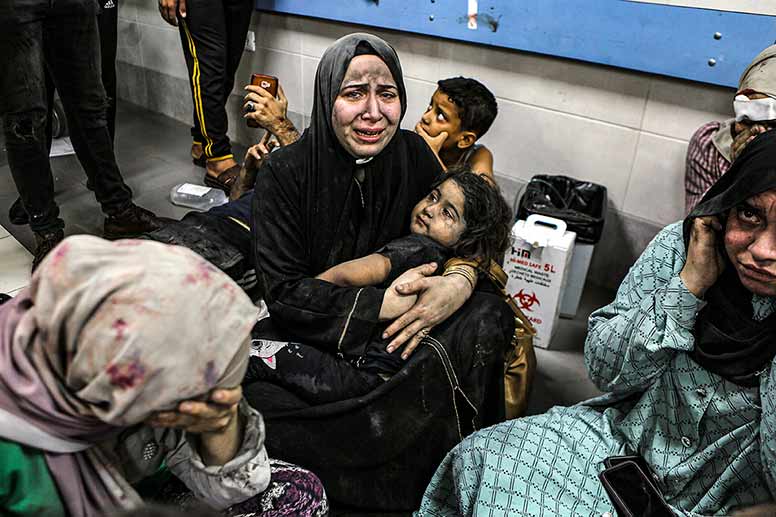The ongoing conflict in Gaza has created an unprecedented humanitarian crisis, where hospitals, typically sanctuaries for the sick and wounded, have become targets in a brutal war. These institutions, which are essential for providing life-saving medical care, are now facing unimaginable pressure as both medical staff and patients struggle to survive amidst the violence. The bombardment of hospitals and health centers is not a new phenomenon in war zones, but the scale and intensity of the attacks on Gaza’s hospitals have left an indelible mark on the international community. With limited resources and already fragile infrastructure, Gaza’s hospitals are being forced to adapt in order to provide care under extreme conditions, while international aid agencies scramble to support the besieged healthcare system.

The Destruction of Vital Health Infrastructure
Hospitals in Gaza are on the frontlines of the conflict, struggling to provide life-saving care while constantly under threat of destruction. Over the past few years, airstrikes have targeted medical facilities, and vital infrastructure has been rendered inoperable due to bombardment. In a region already suffering from an economic blockade and a lack of medical supplies, these attacks have only worsened the humanitarian crisis. The destruction of hospitals and clinics directly impacts the ability to provide essential healthcare services, from emergency surgeries to routine medical treatments. As a result, doctors and medical staff are often forced to work in makeshift conditions, treating patients in overcrowded hallways and improvised spaces.
The Impact on Medical Personnel and Patients
For the doctors, nurses, and other healthcare workers in Gaza, the situation is dire. With a lack of adequate protective gear and resources, they are putting their own lives at risk every time they step into a hospital. The constant threat of airstrikes, combined with the physical toll of treating large numbers of injured people, has left medical personnel exhausted and traumatized. In addition, hospitals are often filled beyond capacity, with injured civilians filling every available space, from beds to hallways. For patients, the lack of medical equipment, including basic supplies like oxygen tanks and anesthesia, makes even simple treatments a life-or-death struggle.

The Struggle for Survival and Care
Despite these challenges, Gaza’s medical teams have demonstrated extraordinary resilience. Field hospitals and emergency care units have been set up in an attempt to keep up with the overwhelming number of casualties. However, these makeshift facilities are not equipped to handle the scale of the injuries being inflicted by the ongoing conflict. In some cases, hospitals have had to make the difficult decision to prioritize certain patients due to a lack of resources, leaving others without the necessary care. The immense strain placed on healthcare professionals is compounded by their inability to evacuate patients or access medical supplies due to the blockade and constant bombardment.
The Role of International Aid and Advocacy
International organizations and humanitarian agencies have been instrumental in providing support to Gaza’s hospitals, though the ongoing violence makes delivering aid extremely difficult. Efforts to send medical supplies, food, and other forms of assistance are often delayed due to security concerns or blocked access. The World Health Organization (WHO) and the United Nations (UN) have called for an immediate halt to the targeting of hospitals and medical staff, urging parties to respect international humanitarian law. Despite these appeals, the targeting of hospitals continues, raising serious concerns about the protection of medical facilities in conflict zones. As the situation in Gaza worsens, the international community faces a growing dilemma on how to effectively respond to the crisis while ensuring the safety and survival of those caught in the crossfire.

The Future of Healthcare in Gaza
Looking to the future, Gaza’s healthcare system faces an uncertain path ahead. Even if the conflict comes to an end, the damage to hospitals and medical infrastructure will take years to rebuild. The psychological and physical toll on medical personnel will also have lasting effects, as many will require extensive support to cope with the trauma of working under such extreme conditions. The rebuilding of Gaza’s health system will need significant international investment, not only in infrastructure but also in training, support for healthcare workers, and the replenishment of medical supplies. For now, however, the focus remains on providing immediate care to those in need and ensuring that hospitals remain functional as much as possible under the circumstances.
A Call for Accountability and Change
The situation in Gaza has brought the issue of protecting healthcare facilities in conflict zones to the forefront of international debate. The deliberate targeting of hospitals and medical staff violates international law and undermines the very principles that govern armed conflict. While there have been calls for accountability and an end to these attacks, the path to lasting peace remains elusive. In the meantime, Gaza’s hospitals continue to serve as symbols of both the immense challenges faced by medical personnel and the unyielding spirit of those working to save lives amid chaos. The world must continue to push for the protection of these vital institutions, ensuring that the wounded and sick in Gaza receive the care they so desperately need.
Conclusion: The Fight for Human Dignity
In conclusion, Gaza’s hospitals have become battlegrounds not just for territory, but for human dignity itself. The destruction of these medical centers highlights the tragic consequences of war and the disregard for international norms that protect the sick and injured. As long as the fighting continues, the survival of Gaza’s healthcare system remains uncertain. However, the resilience of medical staff and the importance of international support offer a glimmer of hope in an otherwise grim situation. The protection of healthcare in conflict zones must be prioritized, and efforts must be made to ensure that hospitals and medical workers are shielded from the horrors of war, allowing them to fulfill their sacred duty of saving lives.